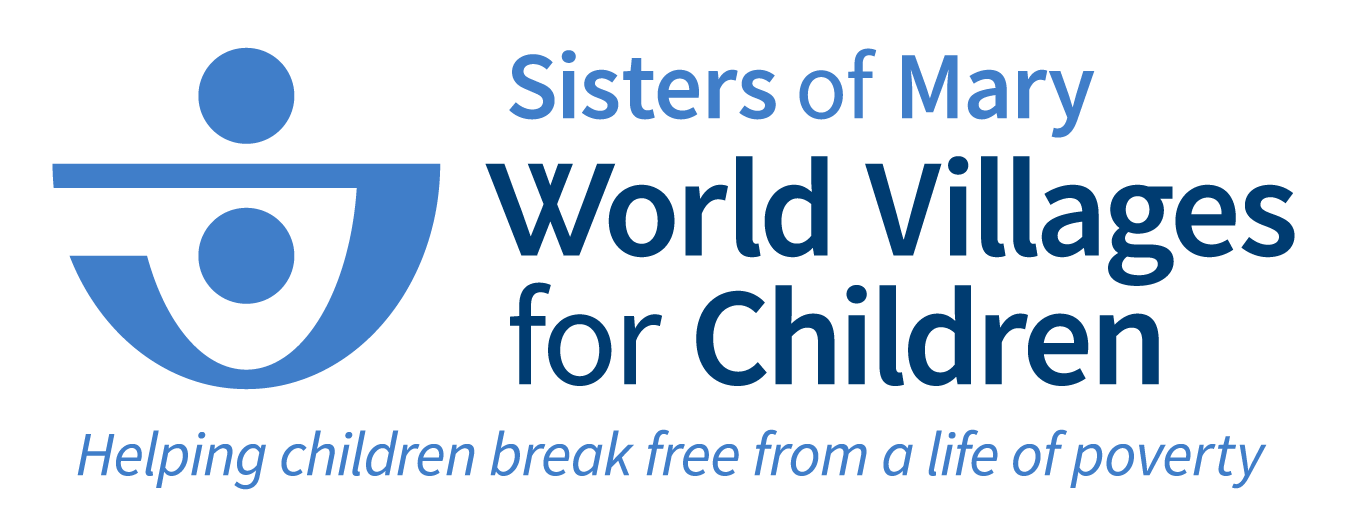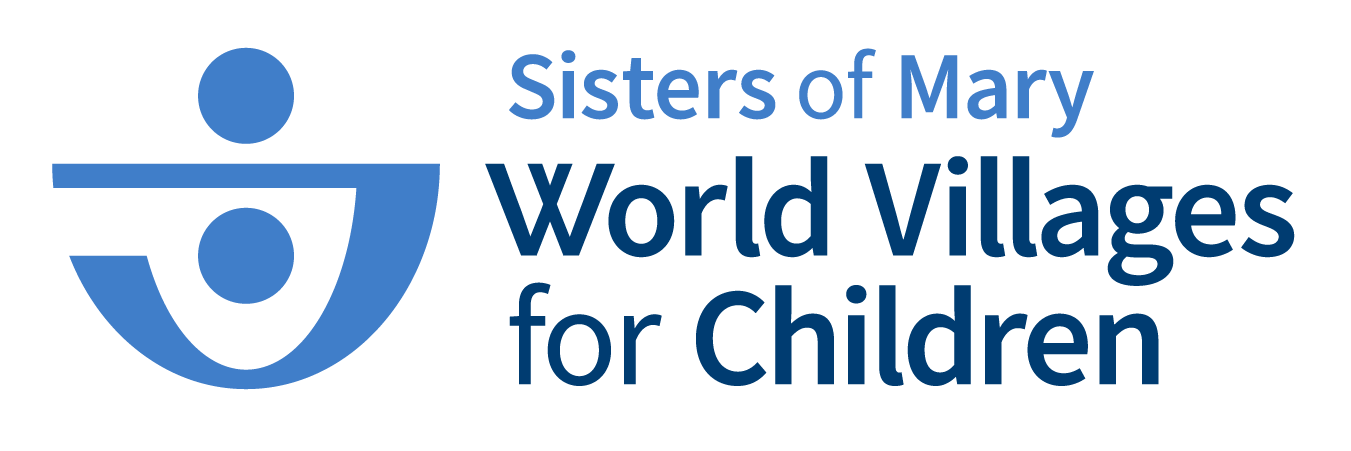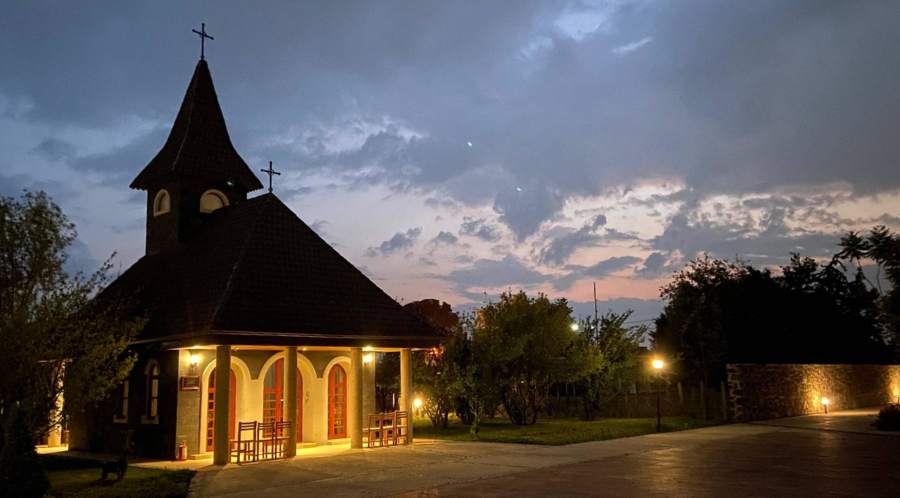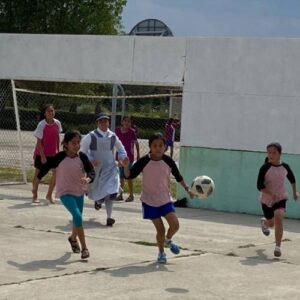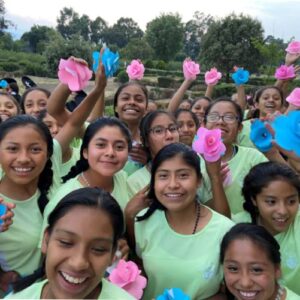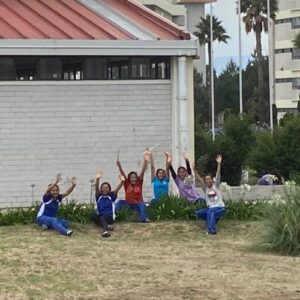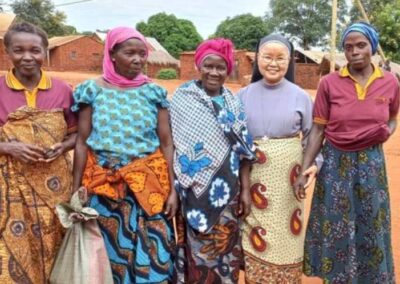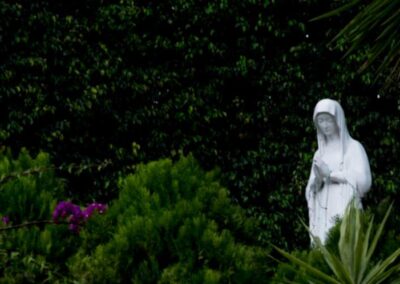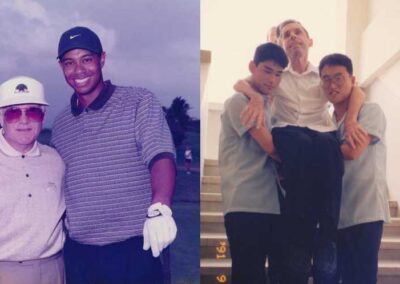SISTERS OF MARY SUMMON FR. AL’S TOUGHNESS TO BEAT THE VIRUS
By Kevin Wells
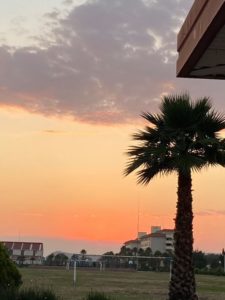
Sunset over our Girlstown in Chalco.
CHALCO, Mexico – It is during these virus-plagued days that Sr. Margie Cheong brings to memory summer evenings from long ago. She’d join Fr. Al and a few other Sisters of Mary on a wide hacienda porch, looking into endless acres of Chalco cornfields, wild sunflowers and cacti. Imposing twin volcanoes in the distance seemed to eavesdrop on their discussions.
It was a dream they were discussing: this landscape would become the home to tens of thousands of young women born into poverty.
Fr. Al had been led to the hardscrabble Mexican town by the Virgin of the Poor. But by 1991, amyotrophic lateral sclerosis (ALS) has stolen much of his stamina and physicality. There was much work to do and money to raise. So as choruses of summer insects filled the night, Fr. Al became like a commander and fading distance runner all at once. He knew the baton had to be passed. He understood he would soon die.
So with a voice that had been softened into a whisper, he spoke with clarity.
“He told us, ‘You continue the work Sisters. You must do this,’ said Sr. Margie on Monday from the same table where she and Fr. Al dined in the hacienda 28 years ago. The Korean-born Sister is the head of the Latin American communities of Mexico, Guatemala, Brazil and Honduras.
“Until the very end, Fr. Al always taught and guided us. It was a time when he had trouble speaking – he often choked as he spoke, but even then, he was joyful and relaxed. We were caring for him in very personal ways, but he kept joking and smiling. He told us, ‘You know, my whole life I’ve been trying to get away from the ladies, now I can’t keep you ladies away from me.”
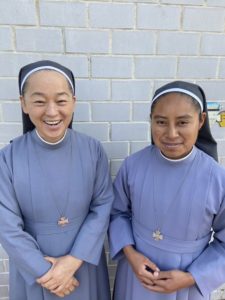
Sister Margie and Sister Martha.
When in early spring, fears of COVID-19 infection seemingly paralyzed the world, it was Sr. Margie who was still holding the baton.
“When I told my dad [James] that I was joining the Sisters of Mary, I remember what he told me,” she said. “He said, ‘When you start, you have to finish’.”
In the face of the virus – and in remembering Fr. Al’s and her father’s directive, Sr. Margie and the Sisters went to work. When in March the Mexican government started restrictions for businesses, schools and day-to-day activities, the Sisters knew they needed to act with urgency, poise and grace. More than 3,300 young ladies in Chalco were about to lose their teachers to quarantine – and more than half of its 80-plus employees – cooks, maintenance workers, cleaners, administrators, landscapers, supervisors, accountants, etc. were set to return to their homes.
Chalco would have to exist with a skeleton workforce.
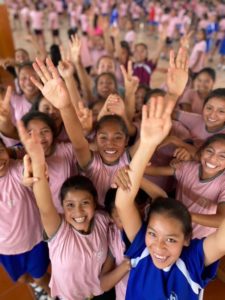
Just a few of the 3,300 girls living and studying in Chalco.
With a depleted staff, no teachers and limited resources – how have the Sisters of Mary maintained proper spiritual, educational and material care for more than three thousand young woman? Well that’s easy. Mother-sisters from locations throughout the world have asked a single question: What would Fr. Al do?
He’d look into the inconceivable, trust Our Lady – and get to work.
So the Sisters of Mary examined the crisis at hand and adjusted smartly and expeditiously. They modified and tacked on duties of employees who remained on site and requested that they sacrifice by taking on additional roles. Each agreed to do whatever possible to help safeguard the girls against the virus. In order to render the virus an impossibility within the Chalco community, all outside visitors were prohibited entrance. Hence, to this day, the community has run seamlessly without masks and social distancing. There has been no sicknesses.
As families of four or five remain mask-free in American homes; Chalco’s family of three thousand-plus exist in this same dimension.
“There’s no need for those measures,” a Sister said this past week. “Precautions have been taken.”
The Sisters quickly adjusted and transferred the duties of temporarily quarantined employees. The 33 employees who opted to remain onsite (they have not left the grounds in more than 45 days) have taken on additional jobs.

Cruz, Lopez, and Herrans sharing a meal together.
Dr. Jesus Jimenez Lopez, who daily treats 50 or so patients in Chalco, has become a part-time chef. For two days this past weekend, he busily prepared a specially prepared lamb (slowly cooked underground) for the Sisters Mother’s Day luncheon. Dr. Jesus’ grandfather taught him how to prepare the “underground lamb” many years ago.
Kindergarten teacher Marisol Velazquez is now cooking, cutting vegetables, taking on various kitchen tasks and delivering food. “Well, I decided to stay here and help the Sisters because the Sisters have always done so much to help me,” Velasquez said. “I think everyone here just wants to do a little extra to help in the Sisters in a difficult time. Wherever the Sisters need help – I’ll go.”
Marcelino Ortiz Herrans, a long-time Chalco administrator and supervisor, today helps clean dishes and tend to kitchen duties. Erika Duran Cruz, the Coordinator of all activities in Villa Aloysius (where retreats groups and visitors stay) is now busy in the dressmaking shop.
“I just like it here,” Erika said. “I just like serving the Sisters.”
Still, what about the 3,300 children with no teachers?
It hasn’t been an issue.
The Sisters and teachers collaborated to hand-select industrious students to teach classes. Relying on the guidance and communication of quarantined teachers, more than one hundred students have volunteered to stand in front of the class to teach their friends.
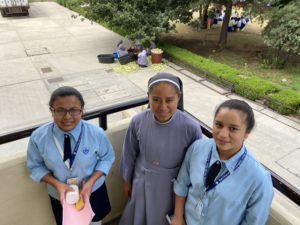
Above are Angeles, who teaches Literature; Sr. Martha, the head of the school; and Marlen, who now teaches Oral Expressions and Reading.
“It’s been an honor. At first I thought, ‘Are they even going to listen to me. Are they going to follow me or obey what I have to say’,” said Marlen, a seventeen-year-old from Puebla who teaches a reading and oral expression class. “But I took it as a challenge. I thought that I might be able to do it. And it’s working well so far.
“The problem with this virus happening around the world is hard for me to understand – it’s like some strange kind of dream, but I can’t let that worry me. I just have to take my own life seriously and what I have been asked to do now [as a teacher].”
Angeles, a 17-year-old from Oaxaca, now teaches Literature. She has been leading her class this week into the fifth ring of Hell in Dante’s Inferno.
“At the beginning, I was a little nervous to be honest, but it was good that I was given the chance to take on this type of responsibility,” Marlen said. “For me, it provided a great way to express my desire to help the Sisters during a tough situation.”
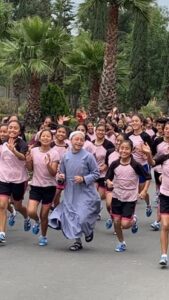
A Sister of Mary going for a run with a group of students.
In this indelicate COVID-19 season in Chalco, everyone seems to have grabbed hold of Fr. Al’s baton.
As school let out on a spring-like Tuesday afternoon, the girls exploded out of classrooms and poured throughout the grounds playing basketball, soccer, handball and field hockey as many hundreds of others circled the one-kilometer track. More than 500 girls danced in the gymnasium as hundreds of others watered the explosions of wild flowers, roses, dahlias and various other native plants.
One hates even to hint at it, but everything seemed precisely as it always does in Chalco in May. Things were normal.
And normal during the Spring of 2020 is the most wondrous thing in the world.
